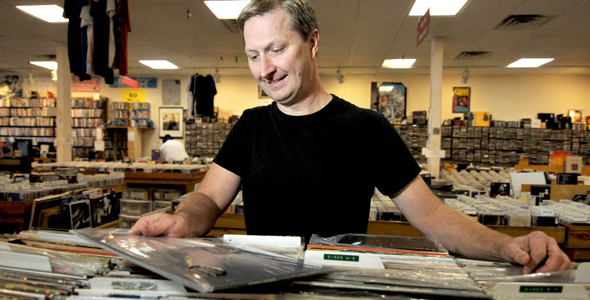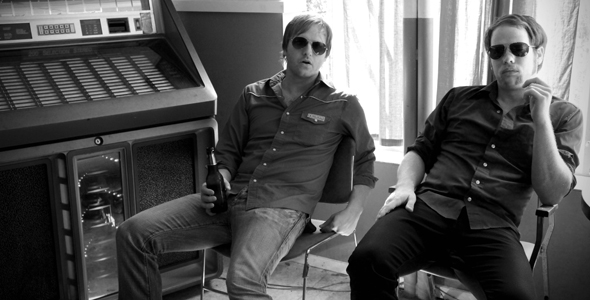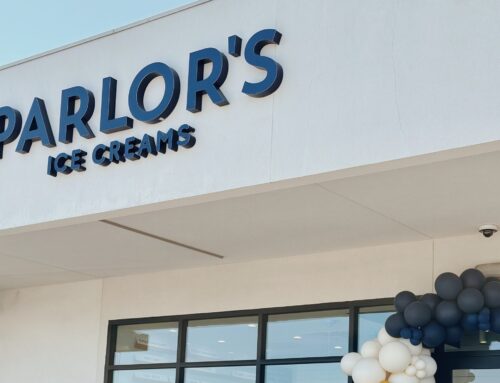Erv Karwelis started Idol Records 20 years ago, and it’s still going strong

Neighborhood resident Erv Karwelis shops for records almost every day. He started his own label, Idol Records, in 1993. Photo by Can Türkyilmaz
This is not a good time for the recording industry.
Two of the biggest record labels, Warner Brothers and EMI, were sold in bankruptcy auction last year, giving buyer Universal almost 50 percent of the market share. Where 15 years ago there were eight major labels, now there are four. Because of streaming and online piracy, even Justin Bieber barely sells a million albums. And the major labels that have survived rely heavily on reissues and compilations to make a profit.
But some of that is favorable for independent record labels. Neighborhood resident Erv Karwelis owns one, Idol Records, and he’s been turning profits for 20 years.
Karwelis moved to Dallas from Los Angeles 25 years ago to work for Sony records. He started Idol as a side business in March 1993 with a compilation CD called “Get It Through Your Thick Skull.” It featured songs from Dallas-based bands including Baboon, Hagfish and Brutal Juice, which all went on to gain major-label deals.
“It was just a hobby,” Karwelis says of the early days of Idol. “There were so many cool bands in Dallas that I wanted to document it.”
Karwelis quit his job at Sony in 1999, around the beginning of the end of the major label, to run Idol full-time. Idol had released albums for two of its biggest bands, Old 97s and Centromatic. Sony already was downsizing, and the timing seemed right, Karwelis says.
One way that Idol has survived is through licensing. Early on, Karwelis started offering his artists’ music for commercials, TV shows and movies.
“Bands used to consider it selling out,” he says. But now music licensing is a common practice, even among major-label artists such as Santigold and the Black Keys.
Idol made its first licensing agreement with MTV’s “Road Rules” in the ’90s, and many more deals with that network followed. Other Idol agreements include bygone rap trio PPT, which once reworked lyrics to a song, originally about Fila sneakers, for an Etnies commercial. More recently, A Boys Named Sue song, “Wheels Off,” appeared in a Vans commercial, and “Breaking Amish” featured a song from The O’s.
The trick to keeping that income rolling is availability, Karwelis says. TV producers, especially in the realm of reality TV, often work on extremely tight deadlines.
“I have relationships with a lot of music supervisors,” he says. “I’m known for being quick to respond.”
Independent labels like Idol have an advantage over major labels because overhead is low. Karwelis offices out of his Gaston Avenue home, for example, and he is a company of one. He hires freelance publicists, A&Rs and other workers as needed, he says. And he is very careful about who he signs. “I can’t just sign a band because I like them,” he says. The musicians have to have mass appeal and marketability. And even more important, they have to be willing to work hard on touring and marketing themselves, he says.
Idol records dozens of local artists, including The Crash That Took Me, Here Holy Spain and Black Tie Dynasty. But Karwelis also has signed bands from all over the states and England. The Fags, from Detroit, went on to sign with Warner Brothers after their 2006 Idol debut, “Light ’Em Up.”
Karwelis says he isn’t sure how the recording industry will recover in the long-term, but he thinks the future could be paid streaming services. Most of Idol’s recordings are available through those services, but they’re not paying much yet. He recently received a check for less than $100 from Spotify, for example, as payment for thousands of plays over several months.
“We’re all hoping it gets better,” he says.
We caught up with a couple of the neighborhood-based bands on Idol Records to find out what they’re up to this year.
The Boys Named Sue and Slick Fifty Seven

The Boys Named Sue, from left to right: Ward Richmond, former drummer Scotty Tecce, John Pedigo and Robert Stave. Photo courtesy of Idol Records
John Pedigo and Ward Richmond met at Woodrow Wilson High School, where they both were in theater and the Variations show choir.
“We were randomly paired to write an ad in theater arts class,” Richmond says. “We wrote a jingle for a fictional company. That was a long time ago.”
They started a band, South, while still in high school.
Richmond had a football scholarship to Brown University, but by that time, he and Pedigo already had started Slick Fifty Seven with pal Rob Schumacher. The band performed in Deep Ellum anytime Richmond was home. In 2002, they signed with an Australian record label and toured all over the world as a full-time job.
“We started Boys Named Sue as a country cover band to perform in Dallas when we weren’t touring,” Richmond says. “We could play every night, and people would come out.”
Locally, the Boys Named Sue became much more popular than Slick Fifty Seven, which broke up in 2006. Richmond recalls sleeping in the Slick Fifty Seven van in the parking lot of an Ypsilanti, Mich., Arby’s in wintertime.
“We were playing two or three hundred shows a year,” Richmond says.
They were tired.
Pedigo went on to form the O’s with Taylor Young, who now is also the drummer for Boys Named Sue. The O’s have released two albums on Idol, “We Are The O’s,” which reached No. 2 on the UK Americana chart, and “Between the Two.” They’ve toured all over the states and Europe.
Richmond bought a house in Lakewood and launched a career in commercial real estate. He also has completed two Iron Man triathlons, the antidote to years in the rock-n-roll lifestyle.
The Boys Named Sue recorded “The Hits Vol. Sue!” in 2009, and they still perform frequently.
“It’s just about fun now, and it doesn’t feel like work,” Richmond says.
Slick Fifty Seven performed at the Goodfriend one-year anniversary party in October, and they were well received, Richmond says. They’ve been playing more shows in Dallas lately.
These Machines Are Winning
These Machines Are Winning is a new project from Little Forest Hills resident Dylan Silvers of Darryl and the Crash That Took Me.
The band’s first album, “Defender 1,” is due out Feb. 12. The album has a synthesizer heavy, electronic punk sound, with guest appearances from local artists including Taylor Rea of Ishi and Tim Delaughter of Polyphonic Spree.
But These Machines are not just a band. They’re a story.
Silvers compares These Machines Are Winning to the Gorillaz, in that they are focusing on comic-book style characters, videos and storytelling. The story is “a cross between Donny Darko and E.T.,” he says. British comic-book and film concept artist Jock designed the album cover.
The band consists of Silvers, a bass player named only Hightower and videographer Ryan Heartsell.
“It’s a man against machines thing, with young guys on BMX bikes rolling around causing trouble,” Silvers says.
These Machines recorded their first album in California earlier this year, and Idol is releasing it on 180-gram vinyl, which will come with a CD as well. That’s not cheap, Karwelis says, but he hopes it will appeal to record collectors and DJs.
“The first 100 copies will be a flat green color that will match some of the colors [on the jacket],” Silvers says. “I’ve only done a 12-inch vinyl one time. Erv’s been super cool about letting us do that.”






